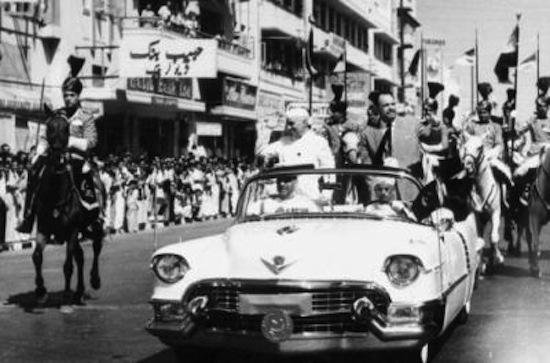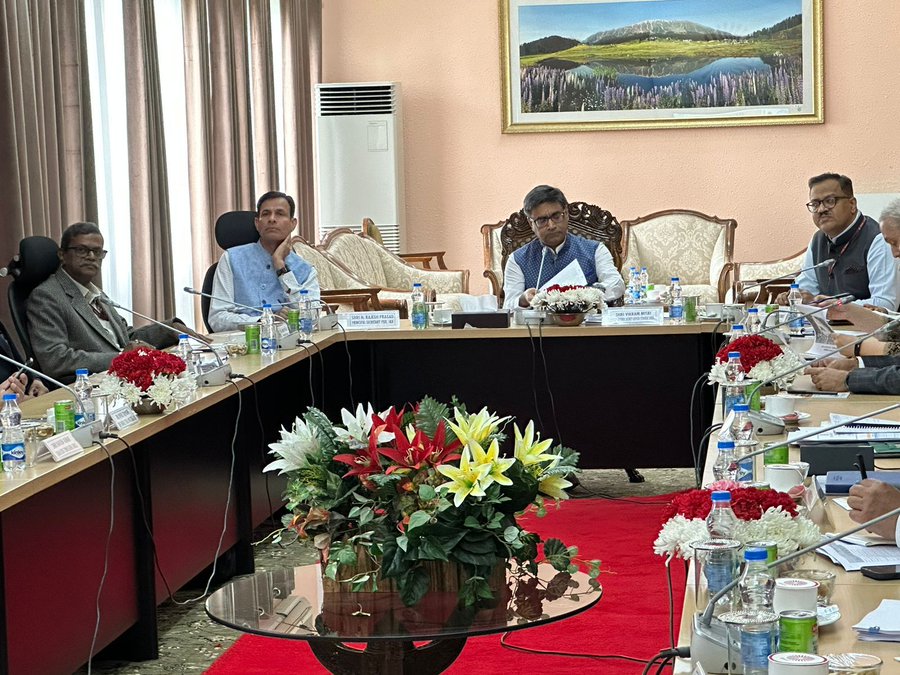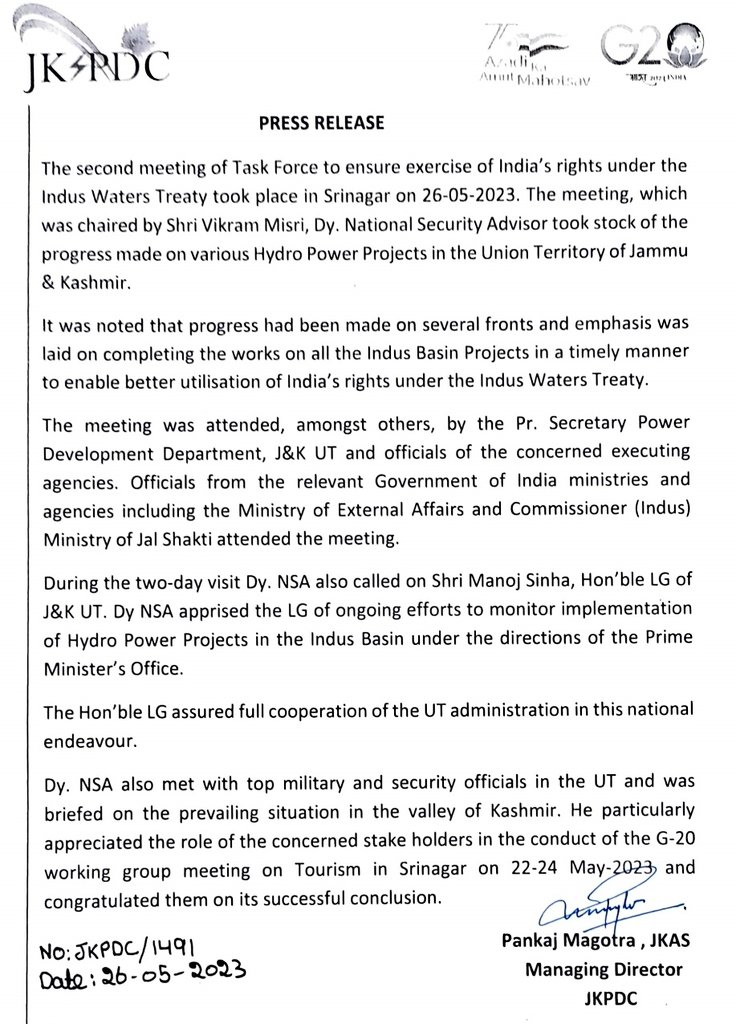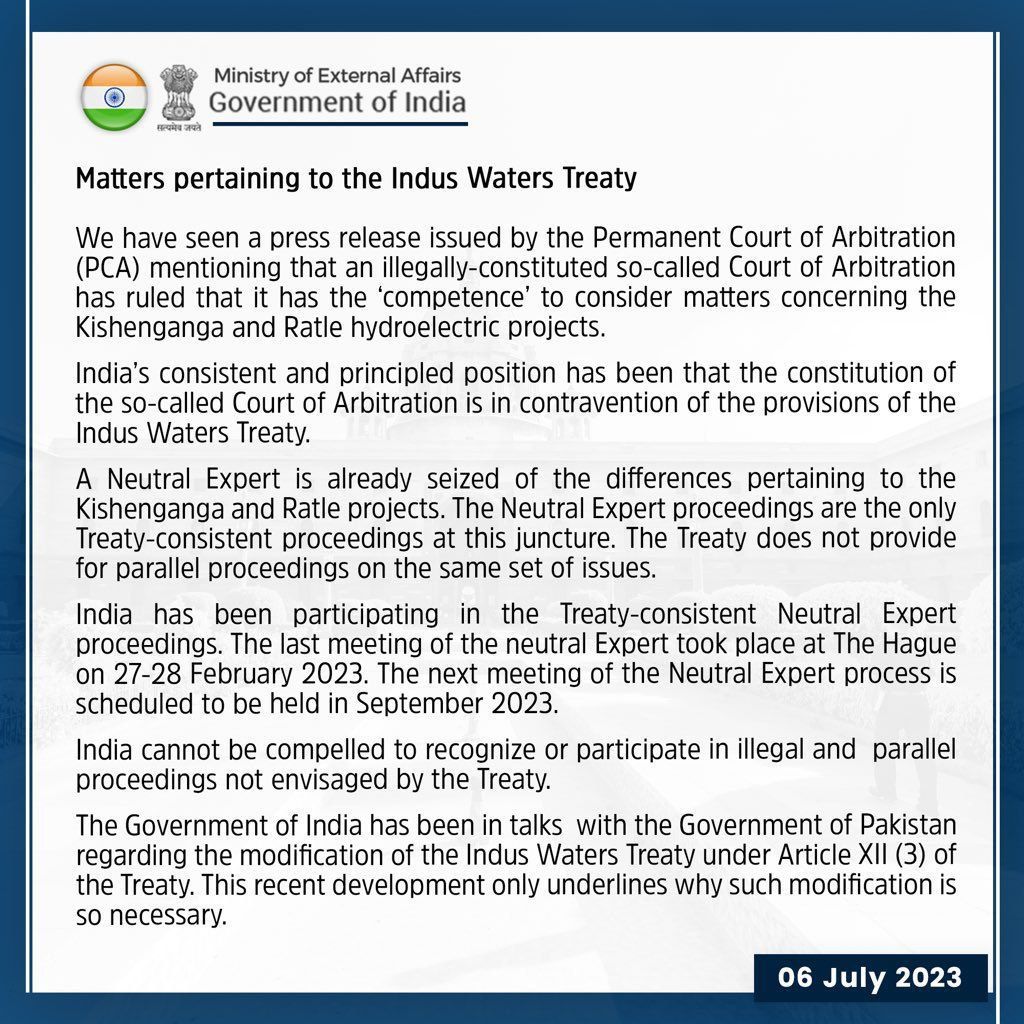but alas, the eagerly coveted nobel continued to evade him till the very end.......
1960 :: PM Jawaharlal Nehru Arrives In Pakistan To Sign Indus Water Treaty
 via@IndiaHistorypic
via@IndiaHistorypic via@IndiaHistorypic
via@IndiaHistorypicAn overall take on the possibilities / way ahead. Worth a read!For now, India has fired the first shot on the IWT. It remains to be seen if Pakistan is ready to negotiate on modifying the treaty or if it will fall back on its old, time-tested but increasingly rusting tactic of blocking any move by India. Pakistan’s past track record is one of never missing an opportunity to miss an opportunity, only to realise later that the terms being offered earlier are no longer on the table. The ball is now in Pakistan’s court.
Same article also says this“Out of five major tributaries of Brahmaputra, only three come from China, rest are from Arunachal Pradesh. Of the total water entering (Brahmaputra), only 7% is contributed by precipitation in China. What can the Chinese do? How much can they divert?" said a senior Indian government official who spoke on condition of anonymity.
According to the Central Water Commission, while 60% of the water in the Brahmaputra comes from India, 40% comes from Tibet.
https://www.usip.org/publications/2022/ ... rahmaputraAccording to the United Nations, the cross border annual aggregate flow of Brahmaputra river system is 165.4 billion cubic metre (bcm) which is greater than the combined trans boundary flow of the three key rivers—Mekong, Salween and Irrawady—that run from the Tibetian plateau to the South East Asia.
While China controls most of the basin’s area, most of that area lies in a rain shadow, formed when monsoon winds rise over Himalayan peaks and then descend again onto the Tibetan Plateau. In contrast, the Indian, Bhutanese and Bangladeshi portions of the basin lie in some of the world’s highest precipitation areas, with rainfall consistently above 98 inches per year.
At one extreme, figures from the United Nations Food and Agriculture Organization (FAO) put China’s contribution to Brahmaputra flow at 30% while at the other anonymous Government of India sources put the figure at 7%. Both figures have been cited to support differing positions.
To provide context for such figures, we compiled data from a range of sources and computed China’s implied contribution to flow along the Brahmaputra’s course. From this work, it appears that the FAO figure is based on estimates of all Brahmaputra basin waters entering India from China (the Brahmaputra mainstem and tributaries including the Lohit and Subashiri) as a share of the Brahmaputra’s flow at Guwahati, about 75 miles from the border with Bangladesh. The Government of India’s 7% figure appears to include only water entering India from China via the Brahmaputra’s mainstem (i.e., excluding tributaries, as a percentage of all Brahmaputra flow up to the confluence of the Padma/Ganges in Bangladesh). Since China’s infrastructure development is and will continue to be limited to its mainstem waters, the 30% figure, by including flows from other tributaries, overstates China’s hydrologic advantage and potential leverage over India. In contrast, the 7% figure underestimates it, by including flows that enter the Brahmaputra in Bangladesh.
Hopefully after 2024 win NDA will dilute/revoke the treaty or even better revoke it sooner and make us jingos happyNew Delhi: India on Thursday questioned the World Bank's decision to appoint a Court of Arbitration and a neutral expert under two separate processes to resolve differences between New Delhi and Islamabad over the Kishenganga and Ratle hydroelectric projects in Jammu and Kashmir.
Last week, India issued a notice to Pakistan seeking a review and modification of the 62-year-old Indus Waters Treaty (IWT) for management of cross-border rivers following Islamabad's "intransigence" in handling disputes.
"I do not think they (World Bank) are in a position to interpret the treaty for us. It is a treaty between our two countries and our assessment of the treaty is that there is a provision of graded approach," External Affairs Ministry Spokesperson Arindam Bagchi said.
India took the significant step of sending the notice to Pakistan conveying its intent to amend the treaty months after the World Bank announced appointing a neutral expert and a chair of Court of Arbitration to resolve the differences over the Kishenganga and Ratle hydroelectric projects.
New Delhi has been particularly disappointed over the appointment of the Court of Arbitration.
"India's Indus Water Commissioner issued a notice on January 25 for the modification of the Indus Waters Treaty of 1960 to his Pakistani counterpart," Mr Bagchi said at a media briefing while replying to a question on the matter.
"This notice was issued with the intent to provide an opportunity to Pakistan to enter into government-to-government negotiations to rectify ongoing material breach of the treaty," he said.
Mr Bagchi said India called upon Pakistan to notify a suitable date for the commencement of inter-state bilateral negotiations under article 12(III) of the treaty within 90 days.
"I am not aware of a response from Pakistan as yet. I am not aware of any response or comment by the World Bank," he said.
The World Bank's role is procedural and it appoints neutral experts or the chair of the court of arbitration in case of differences between India and Pakistan on issues relating to cross-border rivers.
"I do not think they (World Bank) are in a position to interpret the treaty for us. It is a treaty between our two countries and our assessment of the treaty is that there is a provision of graded approach," Mr Bagchi said.
New Delhi considers the start of the two concurrent processes to resolve the dispute a violation of the provision of the graded mechanism prescribed in the pact and wondered what will happen if the mechanisms come out with contradictory judgements.
"The world bank itself, around five-six years ago, acknowledged the problem of having two parallel processes. Our interpretation and assessment is that this is not in consonance with the provisions of the treaty and hence we have been talking about a graded approach," Mr Bagchi said.
The spokesperson said India's position on the matter has not changed at all.
"I do not know whether the World Bank has changed its position on it," he said.
India has not cooperated with the Court of Arbitration.
The IBRD (which mediated the IWT) has no role to play in the fulfillment or modification or revocation of the Treaty. Its only limited role is in the appointment of an NE or convening a CoA in case of a dispute. India is giving Pakistan a chance to have a formal Treaty that would be a follow-up to the IWT which was negotiated seven decades back.neeraj wrote:"World Bank Can't Interpret It For Us": India On Indus Water Treaty
Hopefully after 2024 win NDA will dilute/revoke the treaty or even better revoke it sooner and make us jingos happy
Rsatchi, a Dharmic country which believes in Vasudhaiva Khutumbakam and Sarve jana Sukhino Bhavanthu would be patient and not indulge in a knee-jerk reaction. I have always said that while such lofty ideals are all right, we must use them only when their enunciation would be advantageous to us. This is one such instance, IMO, where we can use them to soften the blow. Nations do not live and die for mere sloganeering, as statecraft is complex, ruthless and bereft of personal ideals.Rsatchi wrote:
1.Is this a preamble to withdraw from IWT??
Bilateral or Multilateral treaties or conventions are not under the jurisdiction of courts, at least in India. Let's not forget that the Kashmiris, including terrorists and the anti-national politicians who support them, have been demanding a greater share of waters from the 'Western Rivers'. They have proved that water is sometimes thicker than blood ! They want to expedite the power projects. If anybody goes to courts, I would welcome that because they would stand naked and thoroughly exposed to where their hearts truly lay. There can be some trouble from the usual quarters like JNU, Kharagpur, Hyderabad and Chennai Universities. N.Ram could write an Edit as to how water should not be used as a tool of war to settle scores. Then, that would give everyone a handle to beat him with as to how his China has scant regards for lower riparian of Yarlung Tsang Po or Mekong etc. But, that would be it.2. If we withdraw given the BIF's/Jihadi/Lawyer Coterie combo can the 'Usual Suspects' go to SC seeking a stay?? Does SC have any locus standi on international treaties to which the state has signed??
Yagnasri wrote:I do not see our SC doing anything on this. But the question is whether we have the political will to take this task to the logical end i.e. getting out of this treaty. As things stand today, we are putting pressure on Pakis. That is all. But if pakis show their pakiness ( I hope they do) then we may go all the way.
fanne wrote:Chetak sir I respectfully disagree taht sc has no role in this. I think it is contempt of Shri cji ji. He has say in everything, should one make love to his spouse or not, how much what way and when it is like rape etc etc. they also have pronounced judgement on who is god and who is not and how when one should be worshipped or not. In many subtle way they have judged which god is better than other. They have also judgement on how and who should play cricket. I mean in all dimension of human and non human existence they have a say, they surely have a say in iwt. In my neck of the wood, climate is very cold for 6 months, I am thinking of getting a verdict to make it summer all year round, would anyone know how to file that?
India warns World Bank on Indus Water Treaty. Don't Interfere in Bilateral Treaty
‘Can’t interpret treaty’: India’s jab at World Bank on Indus Waters Treaty stand
Feb 03, 2023
Excellent article SS saar. Please also provide your insights on what Modi sarkaar is thinking as next steps. What are the modifications to be expected and will there be a full abrogation at some point, after demonstrating that all other avenues are exhausted? The nation and unwashed nanhas like moi want to know.SSridhar wrote:Turbulent Waters
Excellent writeup sir. As to this, useful idiots will always jump up and down overplaying the Chinese bogey - "what will China do if India steps out of line one single time onlee" as if China has kept up her side of things in all understandings with us so far.SSridhar wrote: Some people are unnecessarily linking our moves in IWT with China & Brahmaputra. China will do whatever it wants to do irrespective of what we do with the IWT or not.
The salvo from India seems to have hit home squarelyg.sarkar wrote:https://www.dawn.com/news/1746179/wishi ... water-woes
Wishing away water woes
Ali Tauqeer Sheikh, April 6, 2023 Gautam
The writer is an expert on climate change and development.:
neverwho was categorically given to understand that generosity towards the pakis, as regards the Indus river waters would vastly improve the chances of his getting full control of cashmere and the amrikis had craftily planted in his head the visions of the nobel that could accrue to such international "statesmen".Vips wrote:Porki RAPE view:
[youtube]jfNAwGrrruE[youtube]
Watch from 35.00 to 45.00 on what was demanded by both countries in their initial demand in 1953. As usual in typical congress induced way India punched way below its weight.
But, Pakistan would not allow low-level sedimentation gates by India because the 'security state' that it is and because of its Faustian Bargain with all the evil forces, all that it has been willing to do is to give India a black eye while willing to go blind in both eyes and lose an arm and a leg too.Vips wrote:"The silt is being deposited in the canals, in the riverbed, in the dams upstream," he says. "It raises the riverbank" and clogs up the dams.
"That means that when it floods, even the smaller floods, overspill the banks of the rivers," he says. And not allowing the river to flow is causing clogging and salinity of Pakistan's farm lands. "Soils are losing their fertility."


It was established in 1899, when neither India nor pukestan existedg.sarkar wrote:https://www.dawn.com/news/1763425/hague ... -over-dams
Hague court rules against India in row over dams
Nasir Iqbal, July 7, 2023
ISLAMABAD: In a major win for Pakistan, the Permanent Court of Arbitration (PCA) in The Hague on Thursday rejected India’s objections to its assumption of jurisdiction in a dispute between the neighbouring countries over the Kishanganga and Ratle Hydroelectric projects, pursuant to the Indus Waters Treaty.
Deciding in favour of Pakistan, the PCA ruled that it was indeed the competent authority to determine the Kishanganga dispute between Pakistan and India, sources in the Attorney General for Pakistan’s (AGP) office told Dawn.
Established in 1899 to facilitate arbitration and other forms of dispute resolution between states, the PCA is a non-UN inter-governmental institution that serves as a forum to address the dispute resolution needs of the international community.
“In a unanimous decision, which is binding on the Parties and without appeal, the Court rejected each of the objections raised by India and determined that the Court is competent to consider and determine the disputes set forth in Pakistan’s Request for Arbitration,” Reuters quoted a court statement as saying.
Pakistan was represented by a team of international experts, assisted by a team from the AGP office and included advocates Zohair Waheed and Leena Nishter, while Barrister Ahmed Irfan Aslam acted as Pakistan’s agent at the PCA.
.....
Gautam
Forget WW2, let them first enforce their judgement on Spratley Islands and China's 9 dashed line in SCS, then we'll talk. India needs to adopt the Chinese approach. Build the infrastructure at breakneck pace, then enforce the new status quo.Pratyush wrote:Who is going to enforce the award?
It's just a bunch of whites who think that they are more important than they actually are.
If this PCA was so powerful. Then why was it unable to prevent WW2.

The most foolish thinking, it like trying to ferry a scorpion on the back expecting to control itself from fear of drowning, its nature is to sting.Guddu wrote:Sridharji;
Looking at the timing, when a response is due from Pak, and the govts claims on POK, do you think the govt might link the two issues. i.e. a quid pro quo whereby good behaviour by Pak makes the water flow smoothly ?.